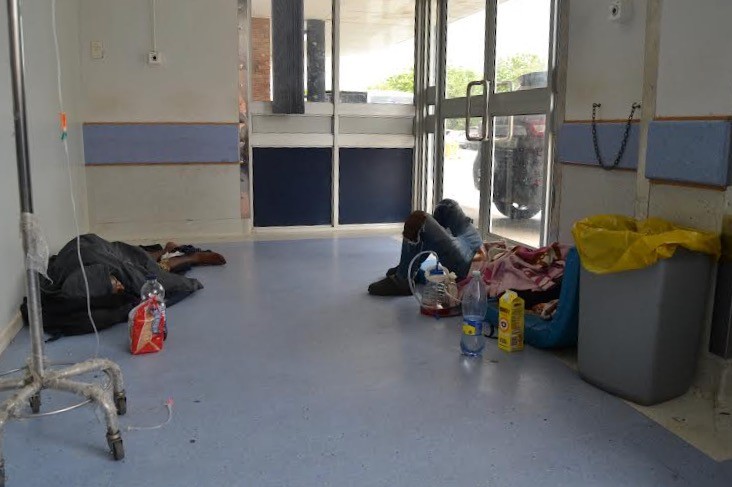Patients lie on the floor at Uitenhage hospital
The health department has acknowledged there is pressure on available beds
GroundUp saw several patients lying on the floor in Uitenhage Provincial Hospital. Photo: Thamsanqa Mbovane
- A shortage of beds at Uitenhage Provincial Hospital in Kariega has meant some patients have to lie on the floor.
- GroundUp saw several patients on blankets or mattresses on the floor of the hospital, some with drips in their veins.
- The health department has acknowledged that there is pressure on beds as the population served by the hospital has grown.
- But, said the spokesperson, the patients lying on the floor had not been admitted to the hospital. Some were waiting to be taken home.
Patients are lying on the floor at Uitenhage Provincial Hospital in Kariega, some with drips in their veins.
When GroundUp visited on Monday a 22-year-old patient with a stab wound was among several people lying on mattresses or blankets on the floor. He said he had been admitted on Sunday afternoon.
“My dad went to the nurses to find out why there are no beds. He is very angry at what is happening at this hospital,” he said. The wound in his chest was being drained through a tube.
Family members of other patients had decided to take them home rather than leave them on the floor.
Khosi Brandy, from Area 11 informal settlement in KwaNobuhle, said she was taking her younger sister home. “I told myself I cannot let her sleep on the floor. I came to the hospital with a blanket but I gave it to a female patient who was shaking on the floor,” said Brandy.
An ambulance driver who wanted to remain anonymous, told GroundUp he had to fetch a patient from KwaNobuhle, but the stretcher he needed was being used by another patient in the hospital.
“Because there are no beds, we let the patients sleep on the stretcher in the corridors until a bed is available.”
On the ground floor there were about 20 patients in the ward, with four lying outside on the floor and others sitting on benches.
One patient sitting on a bench said she was from Despatch and had been admitted on 1 November. She still did not have a bed.
“There are no beds here; no food. The only thing we eat is porridge or else you buy your own food.”
“And if you keep complaining you will receive full attention from a nurse who will hurl insults at you,” she said.
Provincial secretary for the National Union of Public Service and Allied Workers in the Eastern Cape Mzi Nkata said the problem stretched across the metro. “Our public health is and has been struggling with the tools that are critically needed to ensure services are delivered for a long time.
“The issue of beds is not affecting only one hospital - it is across Nelson Mandela Metro and other regions,” she said.
Mkhululi Ndamase, spokesperson for the MEC for Health in the Eastern Cape, said the people sleeping on the floor had not been admitted as patients. He said it was a waiting area.
“On several days, patients who have been treated and discharged, choose to sleep there in that area, while awaiting full daylight before walking home or their lifts are able to collect them.”
But, he said, the department acknowledged that “there is pressure on the available beds”.
This can be attributed to the increase in demand for care as the Kariega community expanded. He said the community had grown “with informal settlements that have mushroomed in recent years”.
“We have also noted a surge in trauma cases and the challenge of mental health that is also putting an additional strain on the hospital’s trauma unit.”
Ndamase said healthcare workers did their best to make the turnaround time as fast as possible.
Some patients chose to go to the hospital instead of a clinic, he said.
“Bypassing primary care services where patients can receive appropriate care does, regretfully, contribute to longer waiting times at Uitenhage Hospital, where we have to attend to critical, emergency cases first. We urge communities to make use of their local clinics for primary healthcare services.”
Support independent journalism
Donate using Payfast

Don't miss out on the latest news
We respect your privacy, and promise we won't spam you.
Next: Chaos as Joburg Water tries to remove illegal connections
Previous: How people in Namaqualand are keeping the Nama language alive
© 2024 GroundUp. This article is licensed under a Creative Commons Attribution-NoDerivatives 4.0 International License.
You may republish this article, so long as you credit the authors and GroundUp, and do not change the text. Please include a link back to the original article.
We put an invisible pixel in the article so that we can count traffic to republishers. All analytics tools are solely on our servers. We do not give our logs to any third party. Logs are deleted after two weeks. We do not use any IP address identifying information except to count regional traffic. We are solely interested in counting hits, not tracking users. If you republish, please do not delete the invisible pixel.

